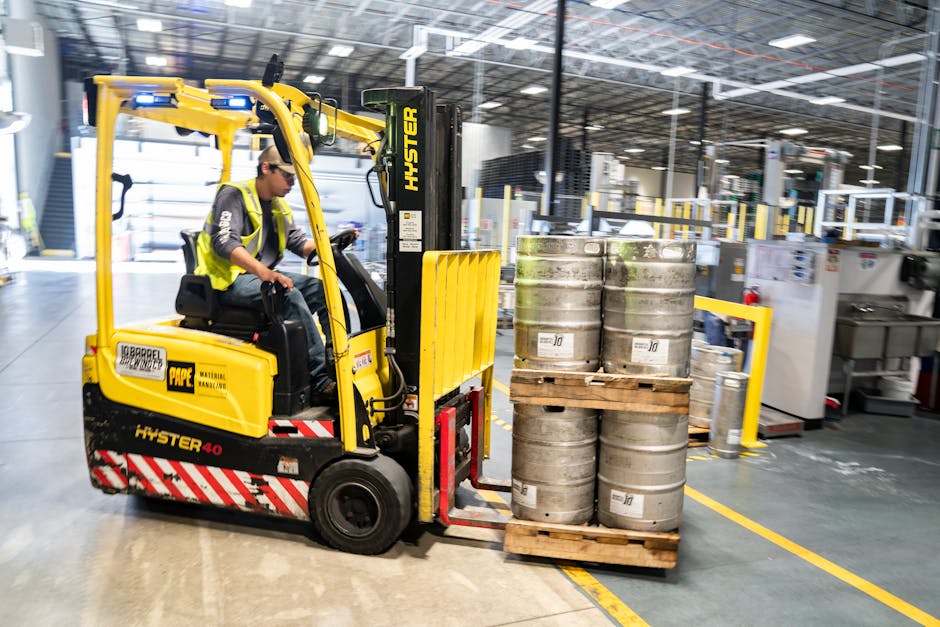Skill Test for Forklift
Manufacturing facilities rely heavily on material handling equipment. Forklifts are the backbone of these operations. However, operating them requires significant skill and responsibility. A comprehensive skill test for forklift operator is essential for workplace safety. It verifies an operator’s practical abilities and theoretical knowledge. Additionally, it ensures compliance with industry regulations and standards. Furthermore, it significantly reduces the risk of workplace accidents and product damage. This guide explores the critical components of an effective evaluation process for manufacturing environments.
Understanding Skill Test for Forklift
A skill test for forklift operator is a multi-faceted assessment. It goes beyond a simple driving check. This evaluation measures competency in real-world scenarios. Therefore, it includes both a written exam and a hands-on practical test. The written portion covers safety protocols and operational theory. Meanwhile, the practical test assesses maneuvering, load handling, and spatial awareness. Specifically, it evaluates the operator’s ability to navigate tight spaces and handle loads safely. This dual approach ensures a holistic view of the candidate’s capabilities.
OSHA and other regulatory bodies mandate such evaluations. They are not optional but a legal requirement in most regions. Consequently, companies must develop rigorous testing procedures. These tests must align with International Labour Organization guidelines. Proper testing protects the company, the operator, and all warehouse personnel. It is a fundamental aspect of risk management.
Skill Test for Forklift Benefits
Implementing a thorough skill test for forklift operator yields immense benefits. First, it dramatically enhances workplace safety. It identifies operators who may lack the necessary control or judgment. Therefore, it prevents potential accidents before they happen. Moreover, it leads to a significant reduction in damaged inventory. Skilled operators handle goods with care and precision. This directly improves the company’s bottom line.
Another key benefit is regulatory compliance. Adhering to UAE government employment regulations and other local laws is crucial. Furthermore, it boosts overall operational efficiency. A certified operator can move materials faster and more reliably. This creates a smoother, more productive workflow. It also lowers insurance premiums and reduces liability. Investing in proper testing is financially astute.
How Skill Test for Forklift Works
The process for a skill test for forklift operator is systematic. It begins with a formal application and documentation review. Next, the candidate undertakes a written examination. This test covers load charts, safety procedures, and operational limits. Additionally, it includes questions on emergency protocols. Typically, a passing score is required to proceed to the practical stage.
The hands-on evaluation is the core of the process. It involves a pre-operation inspection conducted by the candidate. Examiners watch for thoroughness and knowledge of the checklist. Subsequently, the operator performs basic maneuvers. These include forward and reverse S-turns, straight-line travel, and quick stops. Furthermore, they must demonstrate proficiency in stacking and de-stacking pallets at various heights. The test often concludes with a simulated narrow aisle navigation.
Best Skill Test for Forklift Practices
Developing an effective skill test for forklift requires strategic planning. First, the test must be standardized for all candidates. This ensures fairness and consistent evaluation. Therefore, use a detailed scoring rubric for the practical exam. Moreover, the test environment should mimic real warehouse conditions as closely as possible. Include common obstacles like racks, columns, and simulated pedestrian traffic.
Examiners must be highly experienced and certified themselves. They should provide immediate, constructive feedback. Additionally, the test should be updated regularly. It must reflect changes in equipment, technology, and World Health Organization workplace standards. Regular updates keep the assessment relevant and challenging. This maintains a high standard of operational safety.
Skill Test for Forklift Implementation
Rolling out a new skill test for forklift operator program requires careful execution. Start by reviewing your current training and certification records. Next, develop or source the testing materials and checklists. Furthermore, schedule the evaluations without causing major disruptions to production. Communicate the new requirements clearly to all existing and new operators.
Partnering with external experts can streamline this process. For instance, you can access our professional resources for templates and guidance. Training your internal staff to become certified evaluators is also a best practice. This builds long-term capacity within your organization. Consequently, you can conduct regular re-certifications and spot-checks efficiently.
Advanced Skill Test for Forklift Strategies
For organizations seeking excellence, advanced strategies elevate the standard skill test for forklift. Incorporate technology such as telematics. This data can track operator habits like speed, impact, and fuel efficiency. Therefore, the test can be tailored to address specific, data-driven performance gaps. Moreover, introduce high-stress scenarios. These simulate equipment failure or sudden obstacles to test reaction times and decision-making under pressure.
Another advanced tactic is continuous assessment. Move beyond a single, pass/fail test. Implement a system of ongoing evaluations and random skill checks. This ensures that competency is maintained over time. Furthermore, align your program with global best practices from sources like the World Bank economic reports on labor productivity. This positions your manufacturing facility as a leader in safety and efficiency.
Skill Test for Forklift Success Tips
Ensuring the success of your skill test for forklift program involves several key actions. First, secure full management buy-in and budget allocation. Without support, the program may lack authority and resources. Therefore, present a clear business case highlighting the return on investment from reduced accidents and damage.
Additionally, foster a culture that values certification. Operators should feel proud to pass the evaluation. Recognize and reward those who demonstrate exceptional skill. Moreover, provide ample practice time and remedial training for those who need it. The goal is competency development, not just evaluation. For complex implementations, consider an expert consultation to tailor the program to your specific needs.
Future of Skill Test for Forklift
The future of the skill test for forklift operator is increasingly digital and immersive. Virtual Reality (VR) and Augmented Reality (AR) are set to revolutionize training and testing. These technologies can create hyper-realistic, zero-risk environments for assessing complex skills. Therefore, they allow for the safe testing of emergency procedures. Furthermore, AI-driven analytics will provide deeper insights into operator performance, predicting potential errors before they occur.
Integration with global trade and supply chain data, as seen with the U.S. Department of Commerce trade information, will also influence standards. As logistics become more complex, the skill test for forklift will evolve to include knowledge of automated systems and IoT-enabled equipment. Continuous learning and adaptation will be the cornerstone of future operator certification.
Frequently Asked Questions
How often should a forklift operator skill test be renewed?
OSHA recommends re-evaluation every three years. However, best practice suggests more frequent refreshers, especially after an incident or observed unsafe operation. A formal skill test for forklift operator ensures ongoing competency.
What happens if an operator fails the practical skill test?
Failing operators should receive specific feedback. They must then undergo targeted remedial training. Subsequently, they can retake the test. They cannot operate equipment unsupervised until they pass the evaluation.
Who is qualified to administer a forklift operator skill test?
The evaluator must have the knowledge, training, and experience to assess operator competence. This is often a certified trainer, a senior supervisor, or an external safety professional with relevant credentials.
Is a written test mandatory for forklift certification?
Yes, a formal evaluation includes both theory and practice. The written test verifies knowledge of safety rules, load calculations, and operational principles. It is a core part of a comprehensive skill test for forklift operator.
Can a skill test be customized for different types of forklifts?
Absolutely. Evaluations should be specific to the equipment. An operator certified for a counterbalance forklift may need a separate test for a reach truck or an order picker. The skill test for forklift must match the machine.
What is the most common reason for failing a forklift skill test?
Poor spatial awareness and unsafe load handling are frequent issues. This includes hitting obstacles, incorrect fork positioning, and traveling with an elevated load. The practical test is designed to identify these critical safety gaps.
Conclusion
A rigorous skill test for forklift is non-negotiable for modern manufacturing. It is the primary defense against workplace accidents and inefficiencies. This process ensures that every operator possesses the necessary skill and judgment. Therefore, it protects your personnel, your assets, and your productivity. The investment in a robust testing program pays for itself many times over. Do not leave this critical component of safety to chance.
Elevate your operational standards and ensure full compliance today. Take the first step towards a safer, more efficient warehouse. Schedule appointment with our specialists to design or audit your forklift operator evaluation program. Build a culture of safety and excellence from the ground up.




